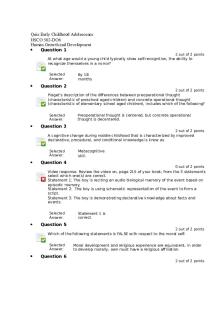Early childhood- Cognitive Development PDF

| Title | Early childhood- Cognitive Development |
|---|---|
| Course | Child Psychology |
| Institution | California State University Sacramento |
| Pages | 3 |
| File Size | 75.9 KB |
| File Type | |
| Total Downloads | 18 |
| Total Views | 139 |
Summary
Early childhood concepts...
Description
4 April 2017
Name
Psych 148
Early Childhood: Cognitive development
Thinking during early childhood
Piaget: Preoperational intelligence - Occurs between the ages of about 2 and 6. - Preoperational because they are not quite logical yet. - Suggests thinking occurs in symbols, not just via senses and motor skills (Symbolic thought) - Includes language, imagination, animism
Piaget: Preoperational thought
Centration - Young child focuses(centers) on one idea, excluding all others. - Egocentrism(centered upon your perspective) Helpful because we don’t want things to be too overwhelming for kids. Focus on Appearance - Young child ignores all attributes that are not apparent. Static reasoning - Young children thinks that nothing changes. Whatever is now has always been and always will be. Ex: Birth of a new sibling, new pet, new daycare, etc. Irreversibility - Young children think that nothing can be undone. A thing cannot be restored to the way it was before a change occurred. Conservation - Principle that the amount of a substance remains the same, (i.e., is conserved) when its appearance changes. Ex: Pouring liquid into two glasses that are the same, and then pouring one into a bigger glass and asking which one has more?
Vygotsky: Social Learning
Development of Executive Function
Zone of proximal development - Sweet spot between what they already know, what they are ready to learn, and what is too hard for them to learn at that time. Scaffolding Over imitation - Tendency of children to copy an action that is not a relevant part of the behavior to be learned. Private speech - Internal dialogue that occurs when people talk to themselves (Silently or out loud) Mental representations of goals, outcomes, and strategies that make it possible to approach problems effectively. Really involves the brain even though its not very good functioning at the moment. Speed of processing. How fast can you process information? Attention Inhibition and Resistance to interference.(Filtering through all the noise in the room, all the distractions to focus on one thing) Cognitive flexibility
Speed of processing: How quickly can one process information? - Memory span
-
Working memory Fuzzy trace theory – where things literally feel fuzzy, but as long as you have a reminder then it pops back into focus. Attention - Attention span - Selective attention - Divided attention
Inhibition and Resistance to interference - How not to respond - Similar to selective attention
Cognitive Flexibility - Ability to shift between sets of tasks or rules
Theory-theory - Children attempt to explain everything they see and hear - Theories are often egocentric - Theories often take context into consideration
Understanding that other people have thoughts, beliefs, and desires that are not necessarily the same as their own. Only children who have older siblings. False- belief task. - Children must predict what another person will do or say, or what another person thinks.
Development of executive control
Children’s theories
Theory of mind
Language Learning
Overregularization - Application of rules of grammar even when exceptions occur. - Noam Chomsky and Steven Pinker Language acquisition Device (LAD)
Summary
Use this space to write a two or three sentence summary of what you just read....
Similar Free PDFs

Early Childhood Case Study
- 10 Pages

Andres Bonifacio Early Childhood
- 12 Pages

Quiz Early Childhood Adolescence
- 9 Pages

Early Childhood project
- 4 Pages

Transition in early childhood
- 4 Pages

Psych 208 Early Childhood Notes
- 9 Pages

ICT in Early Childhood Education
- 3 Pages
Popular Institutions
- Tinajero National High School - Annex
- Politeknik Caltex Riau
- Yokohama City University
- SGT University
- University of Al-Qadisiyah
- Divine Word College of Vigan
- Techniek College Rotterdam
- Universidade de Santiago
- Universiti Teknologi MARA Cawangan Johor Kampus Pasir Gudang
- Poltekkes Kemenkes Yogyakarta
- Baguio City National High School
- Colegio san marcos
- preparatoria uno
- Centro de Bachillerato Tecnológico Industrial y de Servicios No. 107
- Dalian Maritime University
- Quang Trung Secondary School
- Colegio Tecnológico en Informática
- Corporación Regional de Educación Superior
- Grupo CEDVA
- Dar Al Uloom University
- Centro de Estudios Preuniversitarios de la Universidad Nacional de Ingeniería
- 上智大学
- Aakash International School, Nuna Majara
- San Felipe Neri Catholic School
- Kang Chiao International School - New Taipei City
- Misamis Occidental National High School
- Institución Educativa Escuela Normal Juan Ladrilleros
- Kolehiyo ng Pantukan
- Batanes State College
- Instituto Continental
- Sekolah Menengah Kejuruan Kesehatan Kaltara (Tarakan)
- Colegio de La Inmaculada Concepcion - Cebu








